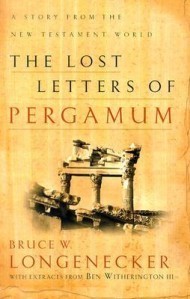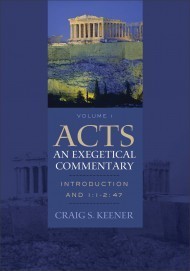Justin Taylor's Blog, page 216
May 1, 2012
David Platt’s Foreword to the New Edition of “When Helping Hurts”
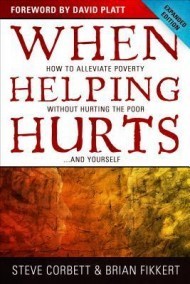 Posted with permission, here is David Platt’s foreword to the new edition (with a new preface and new chapter on application) for the book When Helping Hurts: Alleviating Poverty Without Hurting the Poor . . . And Yourself by Steve Corbett and Brian Fikkert (Moody, 2012):
Posted with permission, here is David Platt’s foreword to the new edition (with a new preface and new chapter on application) for the book When Helping Hurts: Alleviating Poverty Without Hurting the Poor . . . And Yourself by Steve Corbett and Brian Fikkert (Moody, 2012):
* * *
We live in a world of urgent spiritual and physical need. Nearly three billion people are living on less than two dollars a day, and over a billion of them dwell in desperate poverty. They are starving in slums, sold into slavery, orphaned due to AIDS, and dying of preventable diseases. Some of them are our Christian brothers and sisters while others of them have never even heard of Christ.
So what are we to do? In light of massive need in the world and in view of God’s merciful concern for the poor, how are we in the church to respond? This question forms the foundation for the pages that lie ahead. Steve Corbett and Brian Fikkert have undertaken a mammoth task in this book, and I praise God for how they have carried it out.
They start with the Word of God, which is where we must begin. A book filled with practical thoughts and economic tips would be vain apart from eternal truth. This book is saturated with Scripture as the authors continually ground their assertions in God-breathed authority. They address poverty alleviation through the lens of redemptive history, and in so doing they rightly exalt Christ as the supreme healer of every human heart, whether rich or poor.
The authors move from God’s Word to God’s people, specifically the local church. Their conviction (which I share) that the local church has a unique role to play in poverty alleviation affects everything they write. In a real sense, they are writing to the church and for the church; they want to see local churches carry out the commands of Christ in ways that are gracious to the poor, good for God’s people, and glorifying to God’s name.
But this book does not stall in the sphere of the theological and theoretical. It moves wonderfully from timeless truth to contemporary application. As you read, you won’t just learn about problems in the world; you will discover how poverty in the world can actually be addressed. In the process of reading case studies, exploring critical questions, and analyzing current events, you will realize that God has given you—and your church—a unique opportunity to be a part of His global plan to make His great mercy known in your community and among all the nations.
For all of these reasons (and more), this book is virtually required reading for everyone in our church who is intentionally engaging the poor here and around the world. I cannot recommend it highly enough for anyone who is passionate about spreading and showing the love of Christ to the “least of these.”
Simply put, I have never read a better book on practically serving the poor, and I pray that God will use this new edition to equip his people to accomplish His purposes in a world of urgent spiritual and physical need for the glory of His great name.
— DAVID PLATT
Pastor, Church at Brook Hills, Birmingham, AL and author of Radical: Taking Back Your Faith from the American Dream
Why “Quantity Time” with Your Kids Is Necessary for “Quality Time” with Them
Mark Driscoll:
Bible Interpretation for Dummies Like You and Me
The Kindle edition of Curtis Allen’s book Education or Imitation? Bible Interpretation for Dummies Like You and Me (Cruciform Press) is currently on sale for $0.99 (90% off). I’m not sure how long the sale will last.
Here’s a little promo video for the book:
Historical Fiction on the New Testament World Written by Scholars
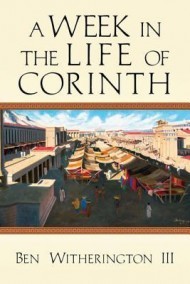 Ben Witherington III, A Week in the Life of Corinth (IVP, 2012).
Ben Witherington III, A Week in the Life of Corinth (IVP, 2012).
IVP: “Ben Witherington III attempts to reenchant our reading of Paul in this creative reconstruction of ancient Corinth. Following a fictitious Corinthian man named Nicanor through an eventful week of business dealings and conflict, you will encounter life at various levels of Roman society–eventually meeting Paul himself and gaining entrance into the Christian community there. The result is an unforgettable introduction to life in a major center of the New Testament world. Numerous full-page text boxes expand on a variety of aspects of life and culture as we encounter them in the narrative.”
Bruce W. Longenecker, The Lost Letters of Pergamum: A Story from the New Testament World (Baker Academic, 2002).
Baker: “The Lost Letters of Pergamum introduces readers to the style of New Testament writings, the social and political world of Jesus and his first followers, and early Christian gatherings. Using the literary technique of correspondence through ancient letters, which comprise much of the New Testament, Longenecker mixes fact and fiction to paint an interesting and informative picture of the New Testament world and early Christianity.
“Transported two thousand years into the past, readers are introduced to Antipas, a Roman civic leader who has encountered the writings of the biblical author Luke. Luke’s history sparks Antipas’s interest, and they begin corresponding. As Antipas tells Luke of his reactions to the writing and of his meetings with local Christians, it becomes evident that he is changing his mind about them and Jesus. Finally, a gladiatorial contest in Pergamum forces difficult decisions on the local Christians and on Antipas.
“The Lost Letters of Pergamum provides readers with a delightful opportunity to step into the world of the New Testament.”
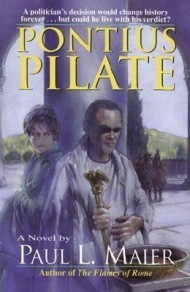 Paul L. Maier, Pontius Pilate: A Novel, 2d. ed. (Kregel, 1995).
Paul L. Maier, Pontius Pilate: A Novel, 2d. ed. (Kregel, 1995).
Andy Naselli: “The book is outstanding! It is engagingly written from Pontius Pilate’s vantage point, starting with Pilate’s political life in Rome and appointment as prefect in Judea (AD 26) and continuing through the murder of Jesus (33 by Maier’s calculation, which is feasible though many scholars prefer 30), death of Tiberius (37), assassination of Caligula (41), and beginning of the reign of Claudius (41-54). The overall plot and every proper name used in the book is historically accurate, and Maier fills in this factual skeleton with colorful fictional details. It reconstructs many events described in the Gospels and Acts from the viewpoint of an educated, unbelieving Roman prefect.
“God used this book to engage our minds even more with the Greco-Roman and Jewish history of NT times in a way that has helped us understand the NT better. It also has deepened our understanding of why Paul calls the gospel offensive foolishness to non-Christians (1 Corinthians 1). Praise God for a historically rooted faith and historically reliable revelation.”
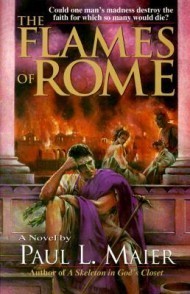 Paul L. Maier, The Flames of Rome: A Novel, 2d. ed (Kregel, 1995).
Paul L. Maier, The Flames of Rome: A Novel, 2d. ed (Kregel, 1995).
Andy Naselli: “A historical novel during the reign of Nero (AD 54-68). . . . [I]t is a fine tool to engage one’s mind with first-century Greco-Roman, Jewish, and Christian history in a way that is virtually impossible by reading only encyclopedia-type summaries of the day. . . . I would not be surprised if both of these books become required reading for NT classes I may teach in the future.”
April 30, 2012
A Brave New World Is Here
 Kyle Smith has a helpful piece in the New York Post exploring various parallels between Aldous Huxley’s 1932 sci-fi dystopian novel Brave New World and the reality 80 years later. Here’s the opening:
Kyle Smith has a helpful piece in the New York Post exploring various parallels between Aldous Huxley’s 1932 sci-fi dystopian novel Brave New World and the reality 80 years later. Here’s the opening:
If Orwell’s “1984″ is a cautionary tale about what we in the capitalist West largely avoided, Aldous Huxley’s “Brave New World” is largely about what we got — a consumerist, post-God happyland in which people readily stave off aging, jet away on exotic vacations and procreate via test tubes. They have access to “Feelies” similar to IMAX 3-D movies, no-strings-attached sex, anti-anxiety pills and abortion on demand. They also venerate a dead high-tech genius, saying “Ford help him” in honor of Henry Ford just as today we practically murmur “In Jobs We Trust.”
In many ways the book, which was published 80 years ago this winter, has become sci-non-fi. It is still developing, taking on additional richness according to the times in which we read it.
You can read the rest here. One more excerpt:
Huxley also foresaw a disturbing partnership between the state and capitalism but didn’t anticipate how little need for government collusion sophisticated marketers would need to reorder society. In “Brave New World,” the state has suppressed all simple sports because they don’t require lots of expensive equipment to keep the economy humming. Instead, it relentlessly hypes complicated tech-y activities such as “electromagnetic golf.” A couple of generations ago, kids might have bought one baseball glove and one bat that would last for years. Today they instead spend hundreds of dollars on Xbox 360s and games that quickly become boring and demand to be replaced with upgraded versions.
Thanks to subliminal messages repeated thousands of times in nurseries while kids sleep, the “Brave New World” characters grow up conditioned to accept a disposable society in which everyone is always hungry for the latest thing and simply discards the old. Huxley would be surprised to see that no such indoctrination is necessary to make people throw away an iPhone that was state of the art three years ago and line up overnight to get a slightly improved version.
In his classic Amusing Ourselves to Death: Public Discourse in the Age of Show Business Neil Postman argued that Huxley’s dystopia was coming to fruition more than that of Orwell’s Nineteen Eighty-Four (1949):
Contrary to common belief even among the educated, Huxley and Orwell did not prophesy the same thing.
Orwell warns that we will be overcome by an externally imposed oppression.
But in Huxley’s vision, no Big Brother is required to deprive people of their autonomy, maturity and history. As he saw it, people will come to love their oppression, to adore the technologies that undo their capacities to think.
What Orwell feared were those who would ban books.
What Huxley feared was that there would be no reason to ban a book, for there would be no one who wanted to read one.
Orwell feared those who would deprive us of information.
Huxley feared those who would give us so much that we would be reduced to passivity and egoism.
Orwell feared that the truth would be concealed from us.
Huxley feared the truth would be drowned in a sea of irrelevance.
Orwell feared we would become a captive culture.
Huxley feared we would become a trivial culture, preoccupied with some equivalent of the feelies, the orgy porgy, and the centrifugal bumblepuppy. As Huxley remarked in Brave New World Revisited, the civil libertarians and rationalists who are ever on the alert to oppose tyranny “failed to take into account man’s almost infinite appetite for distractions.” In 1984, Huxley added, people are controlled by inflicting pain. In Brave New World, they are controlled by inflicting pleasure.
In short, Orwell feared that what we hate will ruin us.
Huxley feared that what we love will ruin us.
. . . Huxley, not Orwell, was right.
Three Forthcoming Books from Baker Academic
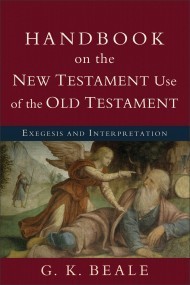 Greg Beale, Handbook on the New Testament Use of the Old Testament: Exegesis and Interpretation.
Greg Beale, Handbook on the New Testament Use of the Old Testament: Exegesis and Interpretation.
“Greg Beale has distinguished himself throughout an illustrious teaching and writing career with his work on the relationships between the testaments. Fresh from producing his magnum opus, a New Testament biblical theology that was thoroughly informed by such uses, Beale here provides a much more manageably sized distillation of the main issues involved in understanding the New Testament’s use of the Old Testament. Strangely, it is the first such volume by an evangelical in some time. Fortunately, it is superbly done.”
—Craig L. Blomberg, distinguished professor of New Testament, Denver Seminary
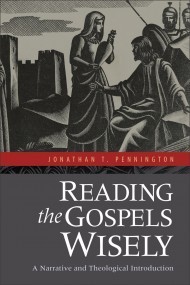 Jonathan T. Pennington, Reading the Gospels Wisely: A Narrative and Theological Introduction.
Jonathan T. Pennington, Reading the Gospels Wisely: A Narrative and Theological Introduction.
“Many books on the Gospels slog through source criticism, form criticism, and redaction criticism–important topics to be sure. How refreshing it is, however, to find a book with a new approach, one that reads the Gospels as literature and sees their importance theologically. This book is like a cool drink of water in what is too often the desert of Gospel studies. While I don’t agree with everything Pennington says, his arguments must be reckoned with, and they further the conversation in productive and stimulating ways. I believe this is the best introductory book on the Gospels. Both students and professors will find it to be invaluable.”
—Thomas R. Schreiner, James Buchanan Professor of New Testament Interpretation, The Southern Baptist Theological Seminary
Craig S. Keener, Acts: An Exegetical Commentary, vol. 1: Introduction and 1:1-2:47.
“Somewhat surprisingly, a social-historical approach to Acts still needs to be defended and its value demonstrated. No one does this better–is more informed about ancient literature, parallels, and precedents, and more interactively and fruitfully engaged with contemporary literature and issues–than Craig Keener. In the Introduction (a monograph in itself), his treatment of the genre of Acts, especially his judicious discussion of the genre ‘novel,’ of the character of ancient historiography, and of the historical integrity and value of Acts, is unbeatable in today’s market. For anyone wanting to appreciate how Acts ‘worked’ in its original context and to get into the text at some depth, Keener will be indispensable and ‘first off the shelf.’ Bring on volumes 2-4!”
—James D. G. Dunn, Emeritus Lightfoot Professor of Divinity, University of Durham
April 28, 2012
An Excerpt from “Evangellyfish”
A friend sent me this excerpt from Douglas Wilson’s evangelical satire novel, Evangellyfish. This section describes Charles Peaborne, a peeved former church employee who now manages his own whistleblower website:
The website was jammed full of PDFs of minutes from ancient meetings, PDFs of long-lost memos (mostly from Charles), and PDFs of affidavits (all from Charles and immediate family members). Charles had unique views of what constituted corroboration. He would produce an affidavit saying that he had once told Chad Lester, to his face, that if Camel Creek did not repent of its wasteful practice of buying high-grade paper for the copiers, and instead go with the perfectly acceptable middle-grade variety, there would be consequences. Then there would be two other affidavits, from his mother and younger brother, testifying that Charles had indeed told them that he had said this to Chad. It was the middle of the evening, and Charles had just finished uploading a whole new line of what he called ‘exposure documents.’ He sat back in his chair in his study at home and stared at the screen, highly pleased.
More excerpts and blurbs here.
April 27, 2012
On Evangelical Swimming the Tiber
The evangelical contributors to the book Journeys of Faith recently spoke at a conference held at Wheaton College.
You can listen here (in one file, unfortunately) to the following talks:
Dr. Gregg Allison, “The Roman Road, or the Road to Rome? Why Some Protestants Drift to Catholicism”
Rev. Chris Castaldo, “Crossing the Tiber: Why Catholics and Protestants Convert”
Dr. Craig Blaising, “Does Accepting the Canon of Scripture Implicitly Affirm Rome’s Authority?”
Dr. Robert Plummer – Moderator
There’s No Such Thing as a Free Blog
 All of us who take advantage of the incredible blessing of free resources on the internet should consider reading this excellent post by Nathan Bingham. He talks about the persistent illusion and the inescapable reality related to these things:
All of us who take advantage of the incredible blessing of free resources on the internet should consider reading this excellent post by Nathan Bingham. He talks about the persistent illusion and the inescapable reality related to these things:
An IllusionThere is an illusion—an act far more enchanting than having an elephant disappear before your eyes—that has spread far and wide across the world wide web. It’s an illusion that is captivating millions. The line of thinking goes something like this: if it’s online then it’s easy. If it’s digital then it’s inexpensive. If it’s composed of bits and bytes then it’s quick.
This belief is not unique to Christians, but over the years I’ve witnessed a Christian voice (perhaps a vocal minority) grow louder in their complaints and demands via comments and emails. In their mind, every Christian ministry is expected to have every possible resource (study tools, videos, books, audio, articles, apps, etc.) available on every possible platform. And they want it now! Not only do they want it now, that want quality, and they want it for free. A thank you is seldom heard when this is actually achieved, after all, it was online and therefore easy, inexpensive, and quick, right?
This is not evidence of Christians growing in grace, but growing under a delusion. As a Christian geek, an ‘insider’ if you will, I’d like to sound a corrective.
The RealityI speak in black and white terms like this because for one to believe that getting quality resources online is easy, inexpensive, and quick is to be deluded.
The reality:
Quality online resources often take a team of people with great skill, at great cost, with a great investment of time.
Read the whole thing here, including three things we can do to serve those ministries that serve us so well.
Praying the Gospel Every Day
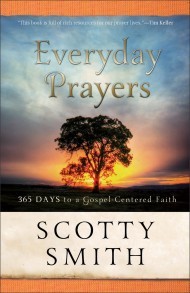 From Scotty’s Smith’s Everyday Prayers: 365 Days to a Gospel-centered Faith (Baker, 2011), pp. 13-14:
From Scotty’s Smith’s Everyday Prayers: 365 Days to a Gospel-centered Faith (Baker, 2011), pp. 13-14:
Praying the gospel involves engaging with all three offices of Christ: Jesus as prophet, priest, and king.Engaging him as our prophet, we listen to Jesus and we look for him in every part of the Scriptures (Luke 24:27).
Engaging him as our priest, we honor Jesus as the perfect sacrifice for our sins, the righteousness we have by faith, and our loving Savior and High Priest who meets and greets us at the throne of his grace.
Engaging him as our king, we submit to Jesus as the one who is making all things new—including us and the broken world all around us.
Praying the gospel involves “redemptive redundancies.” I intentionally always come back to who we are in Christ and who he is in us. Like Luther said, we need the basics of the gospel every day because we forget the gospel every day.
Praying the gospel also involves connecting with the grand meta narrative of the Bible, which runs through and connects all sixty-six books. This redemptive-historical way of praying helps us remember our calling to be characters in and carriers of God’s story. God’s story unfolds through the fourfold plotline of creation, fall, redemption, and consummation. Keeping this big story line in mind helps us consistently focus on the person and work of Jesus.
Indeed, the central and operative question in life is not “What would Jesus do if he were here?” Rather, it is “What is Jesus doing?” since he is right here, and everywhere else, right now. The two things that Jesus has “signed on for”—the two things that are central to the history of redemption and echo through every one of these prayers—are his commitment to redeem his bride from every nation and his commitment to restore creation and usher in the new heaven and new earth at his return. These two passions of Jesus are assumed in every one of my prayers.
The book looks excellent. You can read some samples here. You can also follow his TGC blog.
Here are a couple of blurbs:
“All those of us who know Scotty Smith and his ministry know he’s a praying man as well as a great preacher, and therefore this book is full of rich resources for our own prayer lives.”
—Tim Keller, pastor of Redeemer Presbyterian Church, New York City
“I want to be led in prayer by a man of God whose heart beats with the music of grace. When I read the prayers of Scotty Smith and pray along with him as I do, my heart sings of the glory of God–being soothed, strengthened, and challenged by the greatness of the gospel.”
—Bryan Chapell, president of Covenant Theological Seminary
“It has been a steady and sober joy and a constant encouragement to begin my day with Scotty Smith in recent months. He awakens me to my sin and need of grace and points me to the Savior every morning. Scotty brings a wealth of pastoral experience to his observations, ones that truly prepare us to walk with the Lord each day. Scotty’s thoughts are perfect for a daily devotional. With an image, a question, or a well-formed phrase, he engages us, but more than that, he leads us to engage our own souls, and to do so in the presence of the God of the gospel of grace.”
—Dan Doriani, senior pastor of Central Presbyterian Church, St. Louis; professor of New Testament, Covenant Theological Seminary
And here’s a word from Scotty to pastors on how they can foster prayer in the local church:
Christianity.com: How can pastors help foster prayer?-Scotty Smith from christianitydotcom2 on GodTube.
Justin Taylor's Blog
- Justin Taylor's profile
- 44 followers


